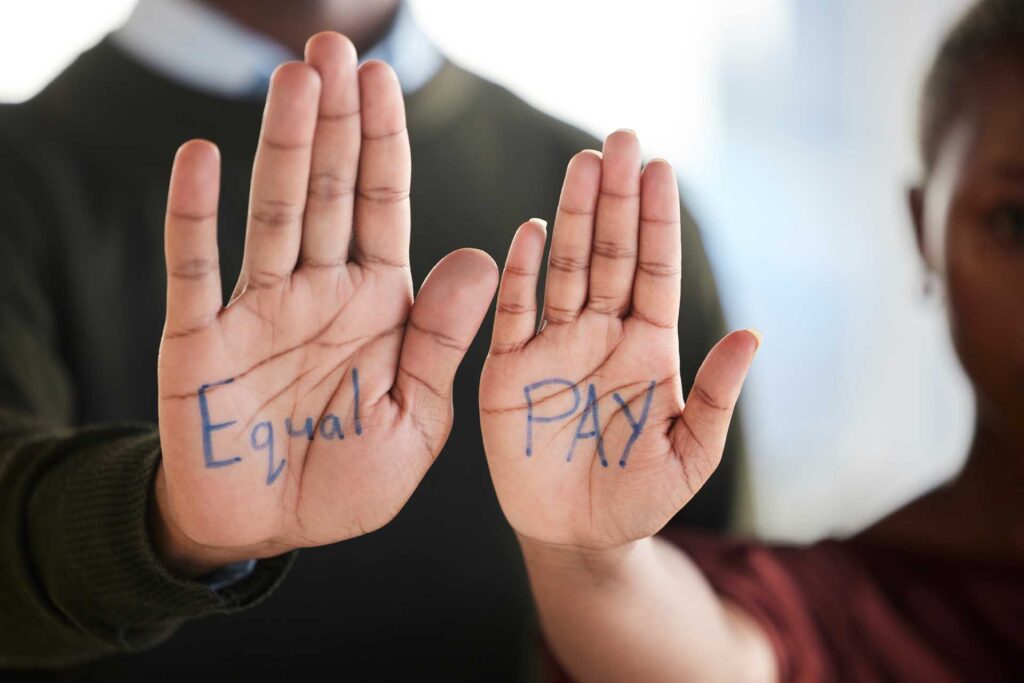
Welcome to our deep dive into pay inequity, a pressing issue affecting Black women in the workplace.
We’ll explore its impact, discuss strategies to navigate it, and highlight the role of employers and policymakers in achieving equal pay.

Understanding Pay Inequity
Pay inequity, in simple terms, is the unfair difference in pay between people who do the same or similar work. It’s like running a race where some people have to start 100 meters behind the starting line – not exactly a fair game, right?
Now, let’s talk numbers. According to Statistics Canada, in 2020, Black women earned 87 cents for every dollar earned by white men. That’s a wage gap of 13%!
To put it in perspective, Black women had to work an extra 50 days to earn what white men earned in a year.
Here’s a quick breakdown:
| Group | Average Earnings | Wage Gap |
|---|---|---|
| White Men | $1.00 | – |
| Black Women | $0.87 | 13% |
But pay inequity is not just about money. It also affects the well-being, dignity, and opportunities of Black women. It can limit their ability to provide for themselves and their families, save for the future, access education and health care, and participate fully in society.
So, while we might chuckle at the absurdity of running a race with a 100-meter handicap, the reality of pay inequity is no laughing matter.
The Impact of Pay Inequity on Black Women
The effects of pay inequity go beyond the paycheck. It’s like a ripple effect in a pond – it starts at one point but spreads out, impacting various aspects of life.
Firstly, there’s the financial impact. With less income, Black women may struggle to meet basic needs, save for the future, or invest in opportunities like education or business ventures. It’s like trying to fill a bucket with a hole in it – no matter how hard you try, you’re always playing catch-up.
Secondly, pay inequity can take a toll on mental health. Constantly battling wage disparity can lead to stress, anxiety, and lower self-esteem. It’s like being in a boxing match where your opponent has an unfair advantage – it’s exhausting and demoralizing.
Lastly, pay inequity perpetuates social inequality. It reinforces stereotypes and biases, and limits opportunities for advancement and leadership roles for Black women. It’s like being stuck in a maze with no exit – it’s frustrating and disheartening.
But don’t lose hope just yet! In the next sections, we’ll discuss strategies to navigate this issue and how employers and policymakers can play a role in achieving equal pay.
Navigating Pay-Gap Gaslighting
Pay-gap gaslighting is a form of manipulation where the existence or impact of pay inequity is denied or minimized. It’s like being told that the sky isn’t blue – it’s confusing and invalidating.
But fear not! Here are some strategies for Black women to navigate this tricky terrain:
- Educate Yourself: Knowledge is power. Understand the facts about pay inequity and arm yourself with data. It’s like having a map in that maze we talked about earlier – it gives you direction and confidence.
- Speak Up: If you suspect pay inequity, don’t be afraid to raise the issue. It might feel like stirring the pot, but sometimes, that’s exactly what’s needed to make a delicious stew!
- Seek Support: Connect with colleagues, mentors, or professional networks. They can provide advice, share experiences, and offer moral support. It’s like having a cheerleading squad in your corner – it boosts your spirits and keeps you motivated.
- Document Everything: Keep a record of your work achievements and any instances of pay-gap gaslighting. It’s like keeping a diary – it helps you reflect, learn, and gather evidence if needed.
Remember, navigating pay-gap gaslighting is not easy, but with these strategies, you’ll be better equipped to handle it.
The Role of Employers in Achieving Equal Pay
Employers play a crucial role in addressing pay inequity. After all, they hold the purse strings, right? Here are some ways employers can promote pay equity within their organizations:
- Transparent Pay Policies: Employers should have clear and transparent pay policies. It’s like having a recipe for a cake – everyone knows what ingredients are needed and how much to use.
- Regular Pay Audits: Employers should conduct regular pay audits to identify and address any pay gaps. It’s like going for a regular health check-up – it helps detect any issues early and take corrective action.
- Equal Pay for Equal Work: Employers should ensure that employees are paid equally for doing the same or similar work, regardless of their race or gender. It’s like giving everyone the same size slice of cake – it’s only fair, right?
- Training and Education: Employers should provide training to managers and employees about pay equity and how to avoid unconscious bias. It’s like learning to drive – it equips you with the skills to navigate the road safely.
- Diversity and Inclusion Initiatives: Employers should promote diversity and inclusion in their workforce, including in leadership roles. It’s like having a variety of flavors in a box of chocolates – it makes it more interesting and enjoyable.
Remember, achieving equal pay is not just the responsibility of individuals – employers have a key role to play too.
Self-Advocacy and Negotiation Strategies for Black Women
When it comes to fighting pay inequity, self-advocacy is a powerful tool. It’s like being your own superhero – you have the power to stand up for yourself and demand justice.
Here are some strategies for successful salary negotiation:
- Do Your Homework: Research industry pay standards and know your worth. It’s like studying for an exam – the more prepared you are, the better you’ll do.
- Practice Makes Perfect: Practice your negotiation skills with a friend or mentor. It’s like rehearsing for a play – the more you practice, the more confident you’ll be on the big day.
- Be Assertive, Not Aggressive: State your case clearly and confidently, but avoid coming across as confrontational. It’s like walking a tightrope – you need to find the right balance.
- Don’t Sell Yourself Short: Don’t undervalue your skills and contributions. Remember, you’re a superstar and you deserve to be paid like one!
- Consider the Whole Package: Salary is important, but don’t forget about other benefits like health insurance, retirement plans, and vacation time. It’s like buying a car – you’re not just looking at the price tag, but also the features and performance.
Negotiation is a skill that can be learned and improved over time. So don’t be discouraged if you don’t get it right the first time. Keep trying, keep learning, and keep fighting for what you deserve!
Policy Changes and Advocacy Efforts to Address Pay Inequity
Change often starts at the top, and when it comes to pay inequity, policy changes can have a significant impact. It’s like changing the rules of the game – it can level the playing field for everyone.
Here are some policy changes and advocacy efforts that can help address pay inequity:
- Equal Pay Legislation: Laws that require equal pay for equal work can help reduce pay inequity. It’s like a speed limit – it sets a standard that everyone must follow.
- Pay Transparency Policies: Policies that require companies to disclose their pay scales can make pay inequity more visible and easier to address. It’s like turning on the lights in a dark room – it makes it easier to see what’s going on.
- Affirmative Action Policies: Policies that promote diversity and inclusion in hiring and promotion can help ensure that Black women have equal opportunities. It’s like planting a diverse garden – it makes the workplace more vibrant and productive.
- Advocacy Groups: Groups that advocate for equal pay can raise awareness, influence policy, and provide support for individuals affected by pay inequity. It’s like having a team of superheroes fighting for justice!
Policy changes and advocacy efforts are crucial in the fight against pay inequity. So let’s roll up our sleeves and get to work!
Pay Inequity: Summary
We’ve reached the end of our deep dive into pay inequity, a pressing issue affecting Black women in the workplace.
We hope you’ve learned a lot from this article and gained some valuable insights and practical tips to help you fight for fair pay and support the cause of equal pay for all.
Here are some key takeaways from this article:
- Pay inequity is the unfair difference in pay between people who do the same or similar work. It affects millions of Black women in the workplace, who earn 87 cents for every dollar earned by white men.
- Pay inequity has a significant impact on the financial, emotional, and social well-being of Black women. It can limit their ability to provide for themselves and their families, save for the future, access education and health care, and participate fully in society.
- Pay-gap gaslighting is a form of manipulation where the existence or impact of pay inequity is denied or minimized. Black women can navigate this issue by educating themselves, speaking up, seeking support, and documenting everything.
- Employers play a crucial role in addressing pay inequity. They can promote pay equity within their organizations by having transparent pay policies, conducting regular pay audits, ensuring equal pay for equal work, providing training and education, and promoting diversity and inclusion initiatives.
- Self-advocacy is a powerful tool for fighting pay inequity. Black women can negotiate for fair pay by doing their homework, practicing their skills, being assertive, not selling themselves short, and considering the whole package.
- Policy changes and advocacy efforts are essential in the fight against pay inequity. Laws that require equal pay for equal work, policies that require pay transparency, affirmative action policies, and advocacy groups can help reduce pay inequity and promote social justice.
Thank you for reading this article. We hope you found it informative and engaging. If you have any questions or feedback, please feel free to leave a comment below.
And don’t forget to share this article with your friends and colleagues who might benefit from it.
Together, we can make a difference and achieve equal pay for all!
Last modified: October 16, 2023



